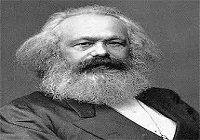Karl Marx, born in Prussia, was a philosopher, economist and a revolutionary thinker. He had developed a rich understanding in labor and was successfully able to relate their effects on capital and hence leading to economic growth. His theories regarding various politics, his views on society and his understanding of economics where collectively referred to what is called as Marxism.
Although Marx was an innovator and an avid thinker his thought were greatly affected by philosophers such as Hegel and Fuerbach. After getting affected by the ideologies of so many thinkers and philosophers Marx developed a view regarding capitalism and according to his view capitalism was intrinsically exploitative and he argued that a prosperous society that followed socialism or communism could only be possible by totally eradicating the capitalism, by mutating the production of social relations.
Marx’s theory of economic was developed on the chain of thought similar to Ricardo and Smith, the Britain’s political economists, now their theories was contradicted with the neoclassical theory that is working today as they emphasized on explaining the distribution of excess while the neoclassic focused more on exchange relations. The major shortcomings of these theories were rectified by Marx and thus Marx explained the concept of labor time and its relation with commodity.
The general concept of economics that was derived from Marx’s writings represents a separate thought process which is just plain unique. Many economists and experts describe his take on economics as unorthodox, as it provides conflicting and exploitative deductions. It would be safe to say that the best way to interpret Marx’s theory would be referring it an attempt to explain social structure and capitalism. As for Marx there was no universal law that governed economics, according to him for every era the economic law would change and the older laws would relevance over the period of time. Marxist viewed that there were no economic law except the relations human beings shared with each other, according to him everything could be solved by his theory of production.
The essence of Marx’s theory has always been anti-capitalism, he always advocated that capitalism’s nature was always exploitative as there was no parameter guiding the growth and demand leading to either two of the conditions: Under consumption or Overproduction. Owing to under consumption or Overproduction, commodities will either remain unsold, the correct values of the commodities will not be realized, and companies will file for bankruptcies more often. Now when the companies would start fearing to go to bankruptcies they start exploiting their manpower and installing more productive machines, which all in all further exacerbate the situation.
The recent advancements in the theory of Marxist economics could be seen due to the change of scenery in the economic environment in the late 1970s. This period revived the interest of people in his theories. During the post war era that is also termed as the ‘Golden Age’ by many expert, Marxist theories was barely discussed as the economy boomed as people thought that his theories were old fashioned and not pertained to their era. This era was also called as Keynesian Era as people thought that his school of thoughts of demand management and distribution was the key to steady growth. When the oil crisis occurred in 1970s it changed everything and finally people started taking interest in Marxist economy analysis, through which they could explain the generated economic problem. The economists who followed Keynesian principles blamed the oil prices as the culprit but the Marxists declared that the oil prices where nothing but the final straw.
Owning to the changing scenarios at such a fast pace Marxist’s economics school of thought has evolved his analysis so as to deal with the ever changing face of Capitalism. Even though his theories appear unconventional to many and have been the topic for debate for many decades now; whatever may be the reason Marx’s theory have always delivered results as opposed to the orthodox nature of the Stalinist theories. It’s very clear that for this century Marxists will continue to guide us with the nature and change that is getting developed in the societies that are purely based on the idea of Capitalism.
Click here for government certification in Accounting, Banking & Finance





7 Comments. Leave new
Good introduction to Marxism
good job!!
Nice article!
great!
Learnt something new
I enjoy reading Marxist theories. I liked your work.
great…